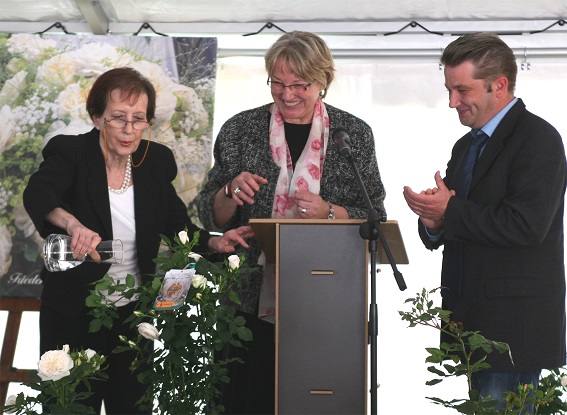Rose baptism at Schloss Gottorf on May 8th, 2015
Friedenslicht® – A rose for peace
 A rose baptism is always something special. But that the naming of a rose has a social and even political meaning is probably unique so far. Now, in Schleswig-Holstein, a rose has been baptized that will not only delight people, but also sustainably support the culture of remembering in the state. On May 8, exactly 70 years after the end of World War II, a white rose novelty from Rosen Tantau was baptized in Schleswig-Holstein with the name " Friedenslicht®".
A rose baptism is always something special. But that the naming of a rose has a social and even political meaning is probably unique so far. Now, in Schleswig-Holstein, a rose has been baptized that will not only delight people, but also sustainably support the culture of remembering in the state. On May 8, exactly 70 years after the end of World War II, a white rose novelty from Rosen Tantau was baptized in Schleswig-Holstein with the name " Friedenslicht®".
Around 170 invited guests, including high representatives of the diplomatic corps, the state of Schleswig-Holstein, the Lutheran Church in Northern Germany, memorial sites and places of remembrance were welcomed to the occasion at Schloss Gottorf in Schleswig by the director of the Stiftung Landesmuseen, Professor Dr. Claus von Carnap-Bornheim.
The former Prime Minister of Schleswig-Holstein Mrs. Heide Simonis and the initiator of the project ProGedenkstätten Mrs. Karin Penno-Burmeister took over the sponsorship for this outstanding rose.
This special event was based on an agreement between Rosen Tantau and ProGedenkstätten, a project supporting memorial sites and remembrance culture in Schleswig-Holstein. The project leader had won over the rose company to launch a new cultivar as a charity rose for the benefit of remembrance culture in 2015 to remember the end of the National Socialist dictatorship and World War II.
Christian Evers, owner of Rosen Tantau KG in Uetersen was pleased about this extraordinary project. "Now it is our pleasure to be able to present the variety Friedenslicht® in the context of this very special baptism with the project ProGedenkstätten at Schloss Gottorf. The nostalgic blossoms of our Friedenslicht® open in a warm apricot cream that turns to white as they bloom. They have a pleasant, light fragrance. The petals are extremely firm and therefore insensitive to rain. It is particularly easy to care for, as its resistance to the troublesome fungal diseases is very high. The shoots fall arching, giving this shrub rose its romantic character."
He handed over one rose to each of the representatives of Schleswig-Holstein's 13 memorial and remembrance sites, which are to be planted at the historical sites. Three plants have already been planted by Heide Simonis on the grounds of the state house in Kiel, and 20 more will bloom in the future on the rose bed at the representation of the state of Schleswig-Holstein to the federal government in Berlin.
The naming of the Friedenslicht® variety is not only intended to remember the historic event. It is also intended to send a political signal and provide lasting support for the peace education work of the memorial sites and places of remembrance.

In her naming speech, Heide Simonis said:
"Seventy years after the Second World War - in these days and weeks there has been much to see, hear and read about the end of a terrible period of German history, but also about liberation from a nightmare. This remembrance work is important, not only because memories fade in the course of time, but also because last eyewitnesses are becoming increasingly rare. Such remembrance work is also particularly important here in Schleswig-Holstein, because after the guilty twelve years of the Nazi regime, mistakes were again made - a new guilt emerged. Many historically burdened people ended up in political responsibility again, which should not have happened.
And there are also - we know it - new Nazis on the move in the country, unteachable people who do not want to learn from history or who reinterpret it to their own interest....
The memories of the crimes of the Nazi regime must be carried forward, not only to understand the outrageous historical break with civilization that happened, but also to be able to avoid a repetition in the future. Even non-guilty people, even the younger generations have an obligation from history in this respect."
Karin Penno-Burmeister, a pioneer of memorial work in Schleswig-Holstein for 20 years, explained, "Remembering the crimes of National Socialism and dealing with its causes and effects is uncomfortable, but absolutely essential. The foundations of democracy in Germany, including in Schleswig-Holstein, emerge from this. The educational work at the historical sites not only informs about the past. It sharpens the view on current developments and points out future-oriented aspects for the prevention of violence. Against the backdrop of history, the culture of remembrance clarifies social and political responsibility for the present and the future."
Klaus Schlie, the president of the Schleswig-Holstein state parliament, also referred to this:
"The construction of a democratic Germany and a reunited Europe ... was a long road, not without obstacles and not without setbacks. This development, unique for Germany and Europe, was made possible ... also by the experiences of two world wars.
The people who started the reconstruction and especially the political rebuilding after 1945 could not forget the war and the dictatorship.
Today, we look back and recognize from this reconstruction effort, but also from the democracy that has been challenged again and again by intolerance, extremism and hatred, that we must not forget the causes of war and dictatorship. That is an active, that is a conscious and above all also a self-aware way of dealing with the past."
The process of coming to terms with the National Socialist past got off to a late start in Schleswig-Holstein. It was not until the mid-1990s that the state of Schleswig-Holstein began providing funding for memorial sites and remembrance culture, but this was nowhere close to being enough to handle the memorial and educational work at the historical sites. The 13 memorial sites and places of remembrance in the state are still mainly managed by volunteers. Only the Ladelund Concentration Camp Memorial, one of the oldest memorials to the victims of National Socialism in Germany and of national importance because of its history, was able to operate professionally on a modest scale thanks to support from the church.
The Lutheran Church in Northern Germany, especially the Church of the Northern Elbe in Schleswig-Holstein and Hamburg, is closely associated with the work of the memorial. The Bishop for Schleswig and Holstein emphasized the importance of their "educational work in the service of our children and grandchildren" and summed up:
"The memorial work makes a central contribution to a theologically, historically and ethically based human rights and peace work.....
I wish that this rose will find attention and success and that it will become a true light of peace. May it blossom - as a helpful contribution to the culture of remembrance in our country."
And State Parliament President Klaus Schlie summed up:
Therefore, today's rose baptism is not just a symbolic act - it is rather the prelude to the promotion of the very concrete peace and comprehension work of the memorial sites, in that parts of the proceeds for the " Friedenlicht®" rose will go directly to the projects. I wish the " Friedenslicht®" many supporters.May with it the memory be kept alive that we all bear responsibility for peace, freedom and democracy in our country, which require from us civil courage and an active commitment.
The charm of this rose, which is as healthy as it is romantic, its name and the message associated with it will hopefully attract many supporters to plant a "Friedenslicht®" and thus also contribute to the culture of remembrance and peace work.
"Friedenslicht®" is available to order now.
